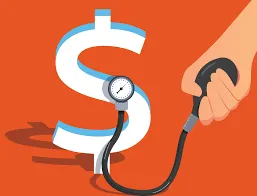
The Hidden Costs of Debt on Your Health
Debt can have a significant impact on more than just your finances. It can also take a toll on your physical and mental health, which can result in a vicious cycle of financial and health problems. Here are some of the hidden costs of debt on your health:
Stress and anxiety Debt can be a major source of stress and anxiety, which can have negative impacts on your mental and physical health. The constant worry and stress caused by debt can lead to sleep disturbances, increased risk of depression and anxiety, and a weakened immune system.
Physical health problems Debt can also have physical consequences, such as headaches, high blood pressure, and even heart disease. The stress and anxiety caused by debt can also contribute to other physical health problems, such as digestive problems and decreased appetite.
Social isolation Debt can also lead to social isolation, as people may feel embarrassed or ashamed about their financial situation. This can result in decreased opportunities for socializing and participating in activities, leading to feelings of loneliness and depression.
Career problems Debt can also have negative impacts on your career, such as decreased productivity and job performance. The stress and anxiety caused by debt can make it difficult to concentrate and perform well at work, leading to potential consequences such as missed promotions and decreased earning potential.
Relationship problems Debt can also cause strain on personal relationships, including romantic partnerships, family relationships, and friendships. The stress and tension caused by debt can lead to arguments and decreased intimacy, resulting in a negative impact on personal relationships.
Difficulty sleeping Debt can make it difficult to get a good night's sleep, as the stress and anxiety caused by debt can result in insomnia and sleep disturbances. This can lead to decreased productivity and decreased overall well-being.
Decreased self-esteem Debt can also impact self-esteem, as people may feel like they have failed financially or are not in control of their finances. This can lead to decreased self-worth and decreased confidence, making it difficult to make progress in getting out of debt.
Debt can have hidden costs on your health that can result in a vicious cycle of financial and health problems. It's important to take action and address debt in a responsible and proactive manner, in order to reduce the impact on your health and well-being. This may involve creating a debt repayment plan, seeking professional financial advice, and making changes to your spending habits.

© Copyright 2023. Elevare Debt Solutions, LLC. All rights reserved.